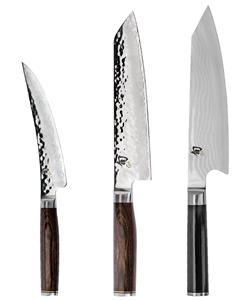What's the Difference Between Japanese Knives and European-Style Knives?
Three words: harder, lighter, sharper.
Tualatin, Oregon, Sept. 21, 2018 (GLOBE NEWSWIRE) -- For most of us – at least when we first started cooking – the archetypal kitchen knife was the European-style chef's knife. Generally, these knives tend to be heavier and made of "tougher" but "softer" steel. They are also usually made from thicker blade stock and sharpened to a wider cutting angle (20 - 25° on each side of the blade), which means it takes more pressure to slice through foods. Because of the softer steel, these knives will also get dull faster and require more maintenance. The benefit of the softer steel, however, is that it enables these knives to take more edge abuse.
Japanese knives, like Shun Cutlery, are different. They are generally lighter in weight and made of thinner, harder, advanced-formula steel. Due to this harder steel, the blade stock can be thinner and the edge more acute – that is, sharper – than a comparable European knife. Shun knives, for example, are sharpened to a 16° angle on each side of the blade. The lighter, thinner blade makes Japanese steel knives extremely agile and precise, and they can even be less tiring to use.
|
||||||||
In Japanese, “Shun” (pronounced “shoon” and rhymes with “moon”) is the precise moment during the year when any particular food is at the peak of its perfection. Shun is when fruit is at its sweetest, when vegetables are perfectly ripe, perfectly fresh, and perfectly delicious. Shun is in harmony with the natural rhythms of the seasons. Shun Cutlery proudly takes its name from this Japanese culinary tradition of preparing and eating the very freshest food at the perfect “shun” moment. It is a tradition we live up to every day, making fine kitchen knives that are always at the peak of their perfection, too.
Since the 13th century, Seki City has been the heart of the Japanese cutlery industry. For more than 100 years, it has also been home to the Kai Corporation, the makers of Shun fine cutlery.
Attachment
Susan Jardina Shun Cutlery 917-825-0466 susan@jardinacommunications.com



